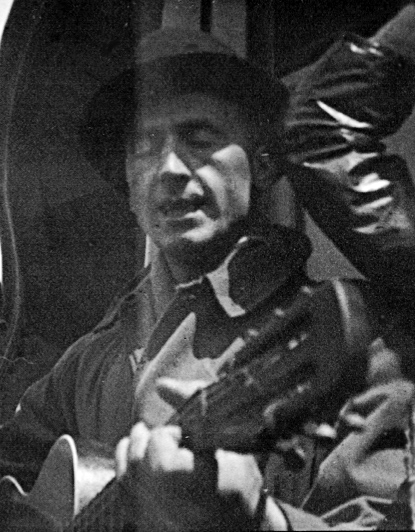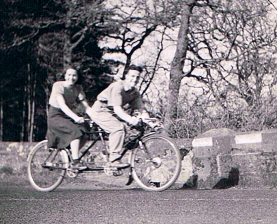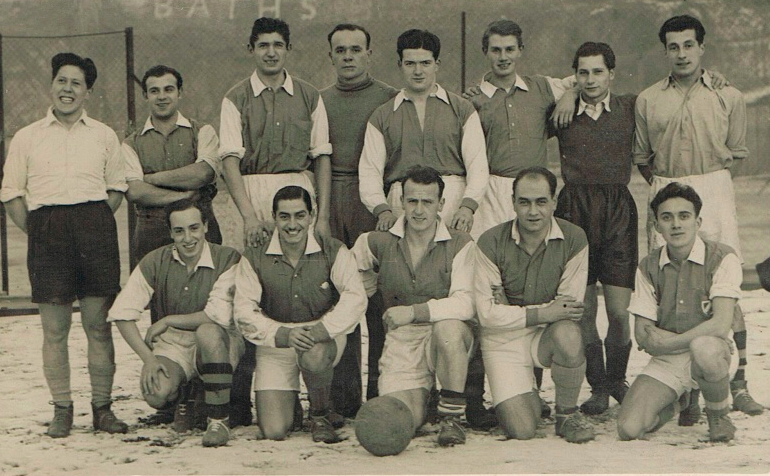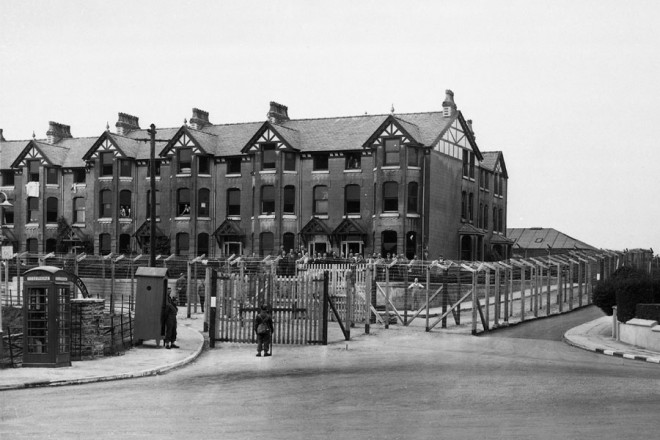Fifty Months and Ten More Days
Alfonso Pacitti
5 Mar, 2021 12:10 pm

My father Alberto Pacitti was interned by the British Government for most of the duration of WWII. The inspiration for this article came from my father’s reminiscing on his time in internment.
On 11th June I began my prison life in Barlinnie. It is quite ironic that previously, I used to sing a ballad that I used to think funny. It was entitled "Eleven More Months and Ten More Days” and the chorus continued “I'll be out of the Calaboose”.
I failed to see anything akin to humour in my situation. If I had known then that my incarceration was going to be somewhat longer, more like "Fifty More Months and Ten More Days”, then I would have thought the ballad even less funny.
This photo from 1938 is of my father Alberto playing his guitar.
On 10th June 1940, the day after Italy entered the war, Alberto was interned along with his father Alfonso and future father-in-law, Silvio Bertolini. It was to be the last time that he would ever see either again. He spent over four years incarcerated in various locations and prisons, Glasgow, London, York but mostly in the Isle of Man. Alberto was released from internment on 12th August 1944; he had spent 50 months (and ten more days) in prisons and internment camps and he was one of the last prisoners to be freed.
My father used a light-hearted and self-deprecating writing style, so I have endeavoured to capture that same style in the following extracts from his war-time memoirs.
Italy enters the War
In the course of the spring of 1940, we acquired a Claude Butler Short Wheelbase Tandem - a really beautiful bike. It would be like buying today a top spec BMW. This machine was a source of great fun and pride for Clem and me.
In particular, we used to look forward to our trips on a "Bicycle Built for Two". We could nip down to the seaside (Ardneil Bay); a round trip of 100 miles was well within our range. It was great fun, a great feeling of togetherness. It was a pity we were to have our beloved tandem stolen It would have made a great “hand-me-down” for the family.
I can very well remember our last outing on the tandem - I have no need of a diary for that.

On the 10th June 1940, Italy declared war on the Allies. The tenth of the month always seems to be a very important day for me; I had initially proposed to Clementina on the 10th of October. On that evening, I was at Clem's house at St Vincent Street when two detectives came to arrest her father and her brother. “What about me?” I asked them. "Don't worry, we'll be round for you in due course" was the reply.
Since it was a nice summer's evening, we went for what was to be our last, and somewhat surreal run on the tandem. Later that evening they came for my dad and me at our home in George Street and they took us both to the Central Police Station, just a short distance away, in the centre of Glasgow.
The Arrest
We spent the night in a cell. Next morning I was called for and thinking that I would be away for a few minutes, I said as I left the cell "I'll see you shortly Dad." I didn’t; and I wasn't to see him ever again. Dear, dear daddy, how you loved me.
Whilst they took me and Gino Bertolini to Barlinnie Prison, my father Alfonso Pacitti and Clem’s father Silvio Bertolini were transferred to the Internment Camp at Bury. Some three weeks later, they were taken to Liverpool where they were embarked on the Arandora Star to be transferred and interned in Canada. On Tuesday, 2nd July 1940 at 07:05am, a German U-boat struck the ship with a torpedo and sunk it, with the loss of hundreds of its prisoners. Both Alfonso and Silvio perished in this disaster along with over 700 other innocent souls.
This next period, from July 1940 to August 1944, left both families in a most difficult situation. The Bertolini family has lost their father, their only son Gino is in prison. Nonna Rosa is left with her two daughters, Maria and Clem, and her niece Luisa, to carry on in wartime as best they could with the Fish Restaurant. What a brave effort they made, with God's help.
Meanwhile the Pacitti family also has to contend with an equally difficult situation. Nonna Pacitti has lost her husband, her eldest son is in prison and she has to run the café and tend, to her extended family; her ageing father Enrico, her younger sister Erminia, and her young family; daughters Pierina, Amelina, Lucia, Mirella, and youngest son Gino. Again, with God's help, they succeeded.
Prison Life
On 11th June, we began our prison life in Barlinnie. What was prison life like? Initially it was diabolical. They allocated us all separate rooms. We were given a cell each: solitary confinement. The cell measured six feet by nine feet. Bedding consisted of a board that hinged back against the wall when not being used. Bed linen was an army blanket and a pillow (straw-filled). A mattress, also straw-filled, was available as an option (6p per night). This I declined for reasons of principle and economics. Sanitary arrangements were basic and primitive; a chamber pot that featured in the first-thing-in-the-morning drill (slopping out). Recreation was provided twice daily; a walk round the prison yard.
On one occasion, we were returning from our recreation to our cells; the Glasgow ‘lot’ who had been ‘collared’ were installed on the top floor of ‘E’ wing. The prisoners from the floor below us were being escorted out when one of them, an ex-pupil of mine (Pat Phee) from St John’s Springboig Approved School (a sort of junior Borstal), recognised me and called out; ”What are you in for, Sir?”. He was hustled away by one of the warders before I could respond. I had always found him a likeable young rogue.
We were very fortunate in our chaplain Father Morison, who not only ministered to us spiritually but also obtained for us much better conditions. Instead of being locked up for something like 23 hours a day; it sounds incredible but it did happen initially; we were given permission for our cell doors to be left open for hours each day. Father Morison also brought in a football and took an active part in the informal games.
Things continued to improve slowly especially when we were allowed visits from our dear ones. My Mum accelerated the process. She came to the prison the day after we arrived and demanded to see her son. The Governor told her that I was "all right" but that was not good enough for your Nonna. She informed him that she was not leaving his office until she saw her son; otherwise, they would have to carry her out. Your Nonna was a very determined lady as many people found out. She won her point, I got my visit, and soon the visiting was put on a regular basis.
Clem came to see me at the first opportunity. Prison was not such a bad place after all, but every good thing comes to an end. I had forgotten to mention that the Consul had told me that in the event of hostilities there would be a ship to re-patriate the Italian Diplomatic and Consular staffs and that there would be a place for me. As it was, when the ship sailed, I was tied up elsewhere, so to speak. It was God's blessing that I was.
{The diplomatic boat referred to by Dad was the Monarch of Bermuda, which sailed from Glasgow on 13th June 1940 with just over 600 nominated Italians headed for Lisbon, Portugal. There, the passengers were transferred directly to the liner Conte Rosso, which had arrived from Italy, with the British Embassy staff and a reciprocal number of expatriate British citizens.}
The authorities decided to transfer me to Brixton Prison because they considered me to be:
(a) the highest-ranking Italian left behind — which I probably was and
(b) dangerous — which I most definitely was not
So, leaving all my friends behind I duly arrived in Brixton Prison just in time for the beginning of the London ‘Blitz' in September 1940.
What a welcome! The worst part was that it meant no visits from my Mum or from Clem. I remember a couple of incidents. We were exercising i.e. walking round the prison yard, when we heard the rumble of an aircraft. "It's all right" said a warder "It's one of ours” However when it dropped a bomb a couple of hundred yards away there was quite a stampede to get back into the cells. Once, a small piece of shrapnel from the anti-aircraft defences came into my cell through a small grill. I kept it as a souvenir but somehow managed to lose it in the course of the next four years.
It was quite a relief when they transferred us all to a former Prisoner of War Camp at York; near the Terry chocolate factory. Our sleeping quarters were somewhat cramped but it was ever so much better than a prison. They housed us in what had been the Totalisator at the York Racecourse and we had access to a piece of ground that we turned into a football field. The chief advantage of our new abode was its closer proximity to Glasgow. This meant easier, shorter and less dangerous visiting conditions. But it was not to last long.
Isle of Man
We were soon to be on our travels again; across the Irish Sea this time, to the Isle of Man. The authorities transferred all of us to the Internment Camp at Peel. The actual location was very pleasant indeed; at least compared with the preceding prison. It was on the sea front at Peel, facing the Irish Sea. A three metre barbed wire fence had boarded off half a dozen Boarding Houses. Access to and from was via a guarded gate. When we arrived, the Camp Commandant informed us that: “if we attempted to escape, the guards had orders to shoot.” He then added humorously, "They will probably miss you". This quip was not at all well received by the soldiers.
On the whole, we were left to ourselves and we set about organising sporting and cultural activities. We had in our midst many talented 'people.
Our chief worry was for our loved ones at home. How were they coping? Being people of Prayer, strong Faith, and Character, they were doing just that; helped by clergy, friends and neighbours. To be enemy aliens in wartime must always be a most difficult situation to find oneself in, yet, such was their standing in the local community, they came in for much sympathy and understanding.
For example, some Italian-owned shops had their windows smashed in. Our café in George Street, which our great grandfather had opened at the turn of the century, remained unscathed throughout the duration of the War. In some part, this may have been due to the local gang leader, a most formidable individual known as ‘Joe the Bull’, who also happened to be a regular patron at George Street. He let it be known that if anyone gave Mrs. Pacitti any bother he would “sort them out". Nobody dared; so he didn't have to.
In fact, there was much sympathy for both of your Nonne and their families in view of the Arandora Star tragedy. In Anderston, the local community greatly respected the Bertolini family as honest, hard-working, religious people. In George Street, the Pacittis were equally appreciated. Your grandfather Alfonso was an outstanding member of the St. Vincent de Paul Confraternity of St. Andrew's Cathedral while Nonna Pacitti was very generous to many of our neighbours. We lived in a working-class neighbourhood and poverty was rife. She tactfully assisted people by offering them light domestic work in return for some payment. This respected their dignity.
Peel Camp
The Internment Camp in Peel held, if that is the right term, what were known as 18B detainees. 18B was the wartime regulation whereby the Secretary of State had the power to detain in custody and without trial, those British citizens about whom he had ‘reasonable cause to believe’ (whatever that was) they might pose some threat to the Realm. The 18Bs were a motley crew (I almost wrote a Mosley crew); British-born of Italian, Irish, German, etc. parents plus those British subjects belonging to Oswald Mosley's British Union of Fascists. More on Regulation 18B here
The Italians made up roughly one-third of the total. I was their leader and we exercised and kept ourselves very fit. We played a lot of football, spending hours at it. As a result, our team, the Squadra Littorio was the name I gave it, was literally invincible. During all that time, four years, we did not lose a solitary game of the twenty-six we played, winning them all. Of this team, I was the captain, trainer, coach, animator and sole selector. Once I even washed the jerseys. However, I soon relinquished this distinction so that the honours could go round.
Practising a sort of football ecumenism, I accepted an invitation to be a guest player for the IRA. I am sure it must have done my political CV a lot of good. I declined an offer to turn out for the garrison team against another Army side because it was conditional on my shaving off the lovely ginger beard that I affected in those days. The beard came off after the first visit at which Clem saw it. "Get that off" were her words; I do not think she liked it.

Squadra Littorio - Inscribed on the reverse of this photo: Peel Internment Camp May 1941.
I can identify Gino Bertolini as goalkeeper and Giovanni (Johnny) Romano (far left kneeling). Johnny was a dear friend of my father and a long-standing teacher colleague; he was only 16 when he was interned; and of course Alberto (middle kneeling). From this team list recorded in my Dad’s diary, I think Derry Coppola is standing back row far right.
It wasn't merely physical activities that took up my time. I was very happy to liaise with the Parish Priest of Peel (“ma tu facevi tutto? Beh quasi” — “but did you do everything? Yes - almost”). I was the Catholic representative and helped to organise religious activities within the camp. We would meet in the evenings for Compline and Rosary. The local priest, Father Dempsey, got permission for the Roman Catholics to attend Mass in his church, under escort of course. It almost emptied the camp; our separated brethren showed a fine spirit of Ecumenism. It was not even fashionable in those days.
Another excellent initiative was the setting up of what we were pleased to call ’The Peel Pocket University’. There was quite an array of talent in our midst: Academic, Literary, Musical, etc., and this was utilised in the range of subjects offered viz. foreign languages: French, German, Italian and Music, Art, and Philosophy. In particular I enjoyed listening to Professor Darwin-Fox; yes, a relative of the famous Darwin, (he was nicknamed ‘Darning Sox’). He gave me his copy of ‘St. Joan of Arc’ by G.B.Shaw.
At one stage, nearly eighteen months into my internment at the Isle of Man, there was an interesting development. An eccentric anarchist called Guy Aldred ran the Striekland Press turning out political copy, mostly pacifist and anti-war. In this work he was supported by another eccentric character, the Duke of Bedford; who had visited our cafe in George Street. At one point, allegedly in the House of Lords, the Home Secretary was asked why a British young man (apparently, he had me in mind) was being interned without having committed any crime. The Home Secretary replied, "These young men are British by accident!”
I followed this up by writing to the Home Secretary that I accepted that view, and would he allow those in that situation who so desired to transfer to other Internment Camps on the island to join their parents. I did not receive any acknowledgement but sometime soon after, in late January 1942, they gave us permission for the transfer. My future brother-in law Gino Bertolini and I no longer had our fathers, but we opted for an Italian Camp situated at Onchan on the eastern side of the island, along with Ugo Rossi and some others from the camp at Peel.
Onchan Camp

Actually, my stay at Onchan was a relatively short one. After some months, I had the doubtful distinction of being expelled! How does one get himself expelled from a Concentration Camp? Therefore, how does a jailbird actually succeeded in getting expelled, “red-carded" if you like? I take great pride in the fact that in my long, long, playing career, I was never shown a card of any colour.
Here is the story of that extraordinary happening. The news of the remarkable record of our brilliant Littorio team had preceded me in Onchan and I was in great demand as a trainer, as I had a qualification in Physical Education. In a short time, I had a small band of devoted enthusiasts doing physical jerks first thing every morning, that is, until one fine morning, in early May 1942, I was given ten minutes to pack.
Next, I was bundled into a small jeep and with an armed escort; nothing but the best for your dad; I was transported back whence I came not all that long ago. I was quite bemused at this but I was not given any explanation.
It later transpired that the Onchan authorities suspected that I was planning a mass escape. The Metropolitan Police who had succeeded the Military, following a riot, were now running the Peel Camp much more efficiently. They thought the whole business very amusing and did not take it at all seriously. Right up to my release in August 1944, I remained on the best of terms with the police. So there you have the story.
Peveril Camp - again
During my detention, I made an attempt to write an Italian grammar book for use in the ‘Peel Pocket University’. It is neatly written out, in very small script, and, on the whole, quite a good effort. You can judge for yourself. The sentences for translation are, mercifully, a cut above ‘My postillion has been struck by lightning'. A mastery of its thirteen lessons should give the student a fair knowledge (or should that be the other way round?) of the language.
So, I did not exactly waste all my time and I was engaged in other activities, many of them even useful. One of those activities was swimming. Interned with us was Frank Vercelli, a diver, who had been a member of the British Olympic Team in 1938. This gave a valuable fillip to water sports in general e.g. water polo.
My friend Derry Coppola was a very accomplished swimmer capable of inspiring confidence in colleagues much less accomplished. So much so that I remember swimming out, under his wing, so to speak, some three or four hundred yards out to sea to a marker buoy, and back to shore. I still don't know how on earth I ever managed it. Needless to say, I never repeated the exploit.
Release
To cut a long story short, one fine day in August 1944, it was Friday, 11th August, I was called "across the wire" to the Commandant's Office and informed that I was being released the following day. It was most surprising for everyone assumed, myself included, that I would be just about the last to leave the Camp. I certainly did not protest.
When I returned with the news, they would not believe me at first, thinking perhaps that I had succumbed to ‘barbed-wire fever’ or some mental aberration. However, when it ultimately dawned on them that I was really going, they were all very nice about it. Fifty months or so is a very long time to be in very close contact with people and the parting was emotional.
I had got on very well with our custodians, so much so that Sergeant Best (a Scot) made me a present of a large hamper, which I found most useful in taking all the stuff I had acquired. Finally, on Saturday morning, 12th August 1944, I left the Isle of Man and my prison for four years. The joy of arriving from the Isle of Man to Liverpool to find my Mum and my Clem waiting for me on the quayside was indescribable.
I wonder if that last sentence was in some small way an anticipation of what Pope John 23rd was to write a generation later:
‘Life is rather like a long sea voyage. We say goodbye with tears when leaving those we love, but lo and behold, when we reach our destination, they are waiting for us at the quayside.’
In researching for this book I have been able to piece together the overall journey that my father took, or rather or was taken, during his internment.
Internment Route
- 11th June 1940: arrested and taken to Barlinnie Prison, Glasgow
- September 1940: transferred to Brixton Prison, London (prisoner #4566)
- November 1940: transferred to Racecourse Camp (Camp 003), Knavesmire, York
- 12th May 1941: transferred to Peveril Camp (House 7, M Camp) Peel, Isle of Man
- 29th January 1942: transferred to Onchan Camp (House 52, O Camp) Douglas, Isle of Man
- 5th May 1942: transferred back to Peveril Camp (House 5, M Camp)
- 12th August 1944: released